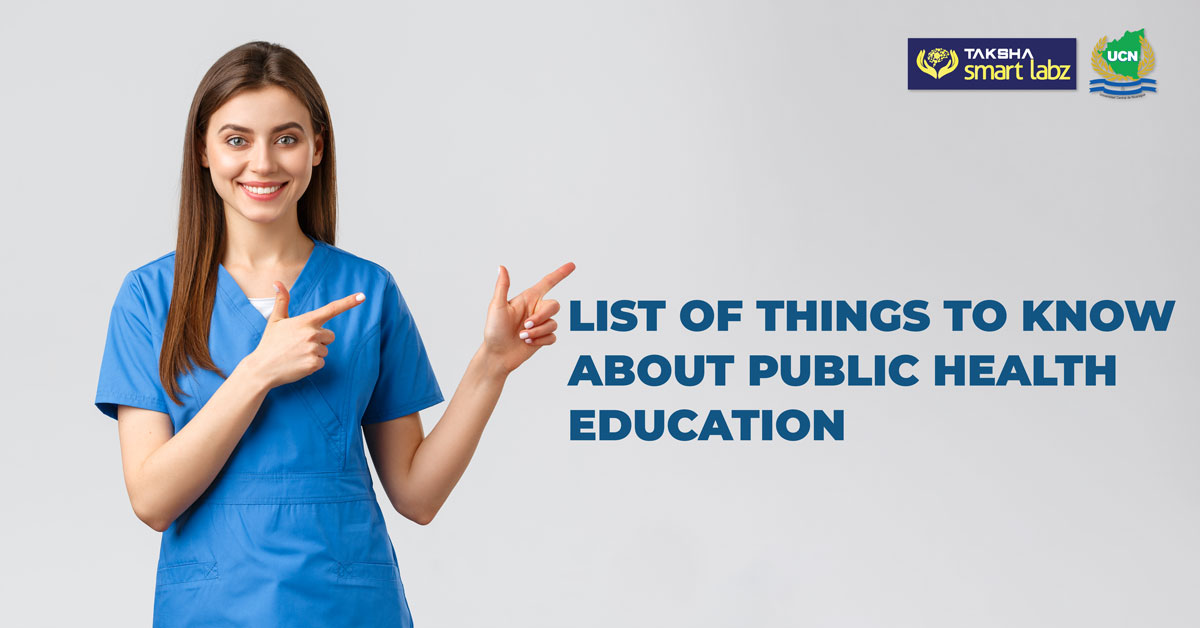Blog Summary
Public Health Education is essential for creating healthier societies through disease prevention, health promotion, and protection. With increasing demand post-COVID, this field offers diverse educational pathways like BA, BS, and MPH, leading to significant career opportunities. Public health professionals play crucial roles in managing emergencies, improving health policies, and enhancing community well-being. A degree in public health equips you with vital skills to tackle global health challenges and make a meaningful impact. Explore the dynamic field of Public Health Education and be part of the movement towards a disease-free world.
- What is Public Health Education?
- What are the Different Public Health Education Programs?
- Public Health Education (Bachelor's Degree)
- Public Health Education (Master's Degree)
- Why Do You Need a Master's Degree in Public Health from TAU-UCN?
- Public Health Careers
- What are the Benefits of Public Health Education?
- What are the changes in Public Health Education post-COVID?
- Is Public Health Education the Right Choice for You?
Looking to clean up your surroundings? Eager to shape a healthier world? Dive into the dynamic realm of Public Health Education! Whether you’re a science enthusiast or passionate about transforming communities, this field holds the key to a brighter, disease-free future. Post-COVID, the demand for public health experts is skyrocketing. Join the movement to promote wellness and create thriving societies. Unlock the secrets to living well and embark on a journey to make a real difference in your homeland!
What is Public Health Education?
The World Health Organization has defined Public Health as “the science and art of preventing disease, prolonging life, and promoting health through the organized efforts of society.”
Public Health is a unique field of science that deals with people’s health. Unlike doctors and other medical professionals, Public Health connects with people directly and indirectly. The main goal of Public Health is to protect safety and upgrade people’s health. This is done through large campaigns, research, and policies.
Public Health has had a remarkable impact on population health by making people healthy and improving their lives. This positive growth of society is due to the efforts of Public Health inventions.
The three major areas of Public Health:
- Protection
- Promotion
- Prevention

What are the Different Public Health Education Programs?
Public Health Education offers two distinct pathways: the Bachelor of Arts (BA) and the Bachelor of Science (BS). The BA program emphasizes social sciences and public health aspects related to human behaviour, social studies, and biology. Conversely, the BS program focuses on natural sciences, integrating mathematics, chemistry, and statistics. Additionally, Public Health Education encompasses other vital areas beyond these degree distinctions.
- Bachelors in Healthcare Administration
- Bachelors in Nursing
- Bachelors in Nutrition
Some Other Public Health Education Courses:
- Epidemiology in Public Health Practice
- Biostatistics in Public Health
- Foundations of Global Health
- Statistical Analysis of Public Health
- International Women’s Health and Human Rights
- Epidemiology: The Basic Science of Public Health
- Systems Thinking in Public Health
- Essentials of Global Health
- Science in Population and Health Sciences
Public Health Degree Programs offer comprehensive training in various disciplines, ranging from epidemiology and biostatistics to health policy and environmental health.
Public Health Education (Bachelor’s Degree)
Bachelor of Public Health from the TAU-UCN is a four-year degree course.
Eligibility:
Students must have qualified in 12 level examinations in a recognized University. In addition, the student must have learned science (Physics, Chemistry, Biology) stream in 10th and 12th class. A student with a 10th class certificate and a diploma (2- or 3-year course) in Allied Health Sciences is also eligible to study Bachelor’s degree in Public Health.
Syllabus:
- Epidemiology
- Women’s Health
- Occupational Health
- Child & Adolescent Health
- Infectious & Chronic Diseases
- Health Systems Management
- Public Health Nutrition
- Disaster & Emergency Management
- Recent Developments in Public Health
- Monitoring & Evaluation in Public Health
- Public Health Project Management
Public Health Education (Master’s Degree)
Suppose you are an Undergraduate in Public Health and desire to gain more knowledge and experience and build a higher level of a healthy community. Then, it’s time for you to fetch a Master’s Degree in Public Health. This course enables a student to learn about Environmental Health and Global Perspectives on Health to face obstacles at the local and global levels.
Earning a Master’s Degree in Public Health (MPH) will open the door to broad job opportunities. For example, a Public Health professional with a Master’s degree can work as a response coordinator, disease investigator, public health analyst, public health policy coordinator, or community health worker.
Requirements:
A Master’s in Public Health requires a Bachelor’s Degree (not necessarily in Public Health) and exam scores in MCAT, LSAT, and GRE). Some colleges also ask for work experience or training experience to select a candidate (health-related working surroundings).
Course Duration:
The Master of Public Health is a two-year course. However, some of the courses are available for 12 months. This 12-month course is also known as the ‘Accelerated’ course. If students are interested in working while studying MPH, they can opt for a Part-time MPH course. However, this takes a lot of time to complete the degree, but students finish it within 2-4 years.
What Do You Learn in MPH?
- Human Biology & Public Health
- Chemistry
- Demography & Population Sciences
- Medical & Health Statistics
- Project Planning & Management
- Research Methods in Public Health
- Communicable & Infectious Diseases
- The health of Vulnerable Populations
- Public Health Nutrition
- Environmental Health & Sustainable Development
- Health Systems Development & Management.
- Occupational, Industrial, and Urban Health
- International Health
- Health Policy, Planning & Economics Research Project
Why Do You Need a Master’s Degree in Public Health from TAU-UCN?
- Broder Job Opportunities
- Wider Knowledge
- Increased Learning Experience
- 40% Increase in Salary
- The course mainly aims to build students’ management skills in health to improve the potentiality, organization, and service of public health programs.
- Produces students for professional careers in various sectors, i.e., public, private, government, national and international.
- Helps in improving career, which includes research, education, and management.
A Master’s in Public Health offers four major benefits: enhanced public health knowledge, better job opportunities (including abroad), flexibility in various roles, and the ability to positively influence your team. For those wishing to maintain their current job, online programs from TAU and the University of Nicaragua provide a quality, internationally recognized option. Eligibility requires a Bachelor’s in science or any bachelor’s degree with two years of relevant work experience.
We encourage you to read our blog, “TAU-UCN’s MPH Program and Career Opportunities,” to explore more about the potential career paths and benefits of this esteemed program.
Public Health Careers
What will you do with a Master’s in Public Health Education?
A Master’s degree in Public Health fetches a handful of job opportunities. However, the foremost goal of public health education is to transform the world into a healthier place. Below, we have listed the career opportunities for MPH graduates and the pay scale.

- Epidemiologist – 62,900 USD/year
- Healthcare Administrator – 65,500 USD/year
- Health Informatics Specialist – 62,600 USD/year
- Public Health Project Manager – 75,400 USD/year
- Health and Safety Engineer – 76,000 USD/year
- Public Health Educator – 45,800 USD/year
- Healthcare Consultant – 76,900 USD/year
- Health officer
- Global health professional
- Disease investigator
- Public health emergency preparedness and response coordinator
- Occupational health and safety specialist
(According to collegedunia.com)
What can you do with a Bachelor of Public Health degree?
Below is a list of opportunities you can pursue with just a bachelor’s degree in the domain of public health.
- Computer and Information System Manager in Healthcare
- Emergency Management Director
- Environmental Scientist
- Health and Safety Engineer
- Medical and Health Services Manager
- Social and Community Service Manager
- Health Education Specialists
- Emergency Response Planner
- Public Health Advocate
- Disease Prevention Specialist
- Public Health Planner
What are the Benefits of Public Health Education?
Below is a list of skills you will gain with a public health degree.
- Enables to observe a Public Health program’s potential.
- Experience in medical policies
- Understanding the impact of medical policies on patient’s healthcare.
- Capacity to assess public health program
- Learning ethical and moral issues in public health.
- Impact of society and culture on individual wellbeing.
- Organizing a public health initiative.
- Knowing the environmental factors that affect health.
- Understanding common nutrition issues.
Reasons to Study Public Health
Each person has their own reason when it comes to choosing a field of work. The following list shows the core traits of the public health domain
- Speedy entry into the medical field
- Manage emergencies
- Adding to current education
- Worldwide Influence
- Problem-solving
- Job guarantee
What are the changes in Public Health Education post-COVID?
The post-COVID situation has changed every one of us, starting with health, education, food, and jobs. Most things are now run online to promote the economy and safeguard people from poverty. But it has also thrown light on Public Health Education intensively.
As a result, the importance and the efficiency of Public Health Education have increased.
There are wider job opportunities in the Public Health field post-COVID. This also turned students’ interest in studying Public Health, which was considered a unique area in the past and most wanted in the present. In addition, job vacancies will increase in the Public Health field as there is more need for Public Health professionals.
Is Public Health Education the Right Choice for You?
- If you are looking forward to entering the medical field without touching surgical equipment, pursue a Public Health degree.
- If you are very concerned about people’s health, then Public Health will be the right choice.
- If you want to make a disease-free world.
- If you want to build a hygienic environment, then fetch a degree in Public Health.
- If you want to create change in public health, then go for a study in public health.
Risk Factors for Public Health Professionals
- Public Health professionals are more vulnerable to physical risks like noise, radiation, and lighting.
- Chemical risk factors also affect Public Health professionals, who primarily work in a chemical environment to diagonalize a patient’s disease.
- While diagonalizing people’s diseases, they are also affected by biological risk factors (disease transmission from patients and droplets from patients’ respiratory systems).
Now that you have a comprehensive idea about public health weigh your options. As this post has shown, public health has a wide array of benefits.












